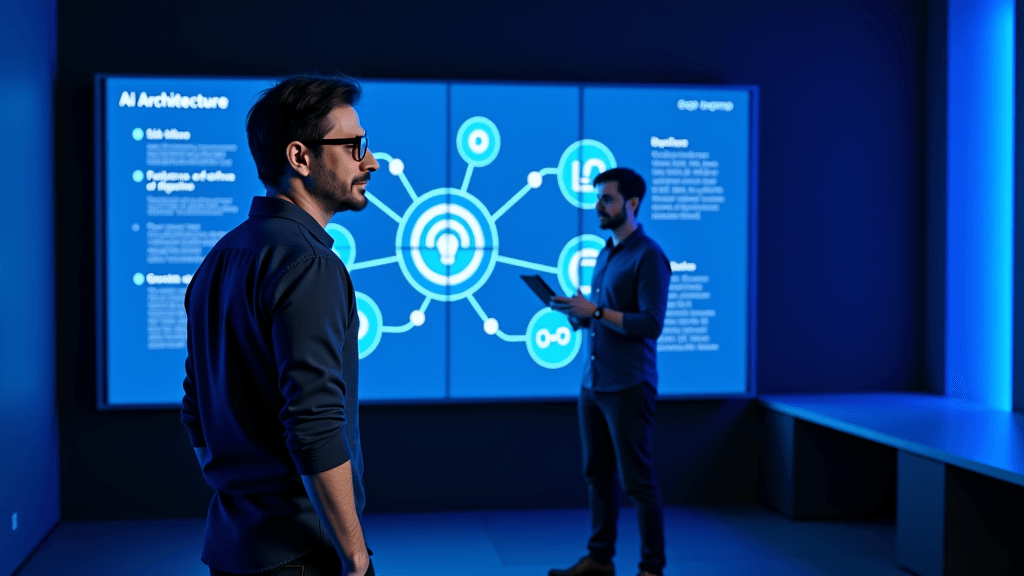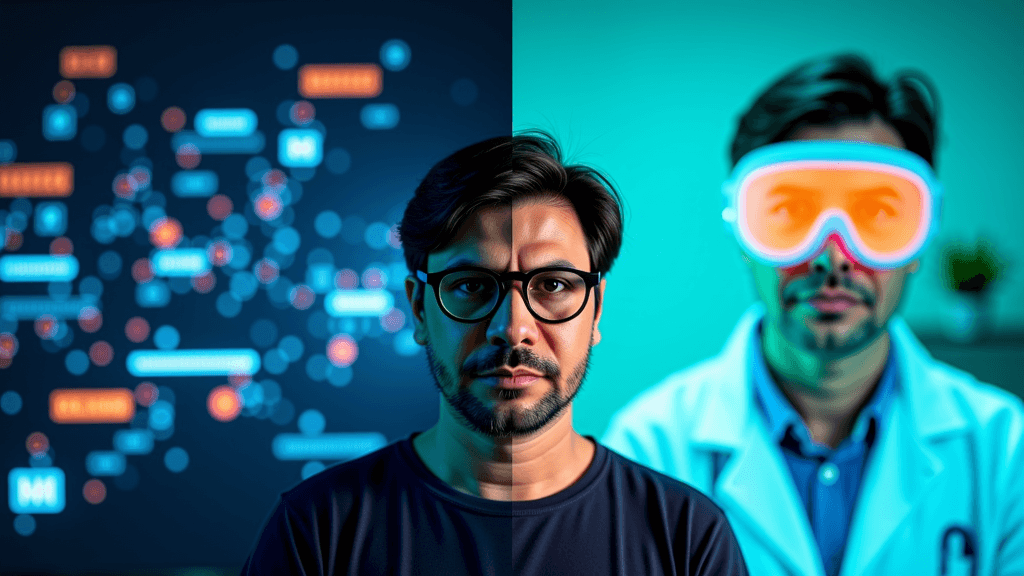AI Radar: From Fake Lawyer to Energy Future – What Happened in the Last 24 Hours
April 10, 2025 | by Matos AI

The past few days have been marked by significant events in the world of artificial intelligence that illustrate both the transformative potential and the ethical challenges that this technology brings. As a keen observer of the innovation ecosystem, I realize that we are living in a moment of unprecedented technological acceleration, with increasingly visible impacts on fundamental areas of society.
Justice finds its first “AI lawyer” case
A particularly fascinating case occurred in the United States, where a Judge halted a hearing after discovering that one of the participants used a completely AI-generated “lawyer”. During a hearing in the New York State Appellate Division, Judge Sallie Manzanet-Daniels did not hide her outrage when she realized she was being deceived by an artificially generated video, exclaiming “I don’t like being deceived.” Participant Jerome Dewald, who was not an attorney and represented himself, chose to present his arguments through a video created by artificial intelligence.
This incident, reported by CNN Brazil, raises profound questions about authenticity and transparency in legal proceedings. In my work with startups and innovation, I have observed that the line between creative use of technology and unethical behavior is becoming increasingly blurred. We need clear guidelines on when and how AI can be used in official contexts.
Join my WhatsApp groups! Daily updates with the most relevant news in the AI world and a vibrant community!
- AI for Business: focused on business and strategy.
- AI Builders: with a more technical and hands-on approach.
AI and the energy challenge: consumption will double by 2030
Another critical issue that is emerging strongly is the environmental impact of the AI revolution. According to a report by the International Energy Agency (IEA), electricity consumption in data centers is expected to more than double by 2030, reaching approximately 945 terawatt-hours (TWH). This massive increase is primarily driven by the growing demand for AI processing.
What few are debating is that this technology race poses significant challenges to global energy security and CO₂ emissions reduction targets. As an entrepreneur who has always advocated for responsible innovation, I believe we need a coordinated effort between the private sector and the government to develop more efficient data center infrastructures powered by renewable sources.
The dark side: fake candidates and potential fraud
AI is not only transforming industries, but also creating new challenges in established processes. A worrying phenomenon has been reported by companies in the United States: candidates completely manufactured by AI are appearing in selection processes. As reported by Tecnoblog, these “candidates” use artificial intelligence to create fake job experiences, forge documents, and even alter their appearance during video interviews.
An alarming report suggests that by 2028, one in four candidates could be a fake AI-generated profile. This trend poses a significant challenge for recruiters and HR departments, who will need to develop new verification strategies.
Similarly, UOL reports that scammers are using AI to create fake images of vehicle damage to defraud insurance companies. This malicious use of the technology illustrates how each advancement in AI brings with it new vulnerabilities that need to be anticipated.
Institutional Advances: Europe and AI Capacity Building
As we address these challenges, we also see important institutional moves to establish leadership and foster the democratization of AI knowledge.
Europe has presented the ambitious “AI Continent Action Plan”, as reported by TeleSíntese. The plan envisages the creation of up to five AI Gigafactories dedicated to training complex models on a large scale, with public and private investment estimated at €20 billion. In addition to the physical infrastructure, the strategy includes the creation of the AI Skills Academy, aiming to train European professionals for AI challenges.
This European initiative reminds me of discussions I have had in innovation forums in Brazil. We urgently need a robust national strategy for AI that combines infrastructure development, talent training, and smart regulation. Otherwise, we risk further widening the technological gap between Brazil and global powers.
In the area of training, OpenAI has taken a significant step forward by launching its free AI academy. As reported by Terra, the OpenAI Academy will offer courses and educational resources covering everything from basic concepts to advanced topics in artificial intelligence. This initiative reflects an important trend: the recognition that democratizing knowledge about AI is crucial to the sustainable development of this technology.
AI in content production: from scientific articles to cinema
AI’s ability to generate original content continues to advance at a rapid pace. A recent milestone was the acceptance of an AI-generated scientific paper 100% at an international workshop. According to a report by Revista Oeste, the article has undergone the peer review process and has been deemed to be of sufficient quality for publication.
This event raises fundamental questions about the future of academic and intellectual production. How will we define authorship and originality in a world where machines can produce content indistinguishable from human content? These are questions that I have been debating intensely with fellow academics and entrepreneurs in the education sector.
In the audiovisual field, Google is revolutionizing video production with its Vertex AI Media Studio. According to TudoCelular, the tool allows the creation of videos from scratch using AI, democratizing the production of audiovisual content. This technology has the potential to radically transform the creative industry, allowing individuals and small businesses to produce quality content without the traditional high costs.
The race between technological giants
Advances in AI continue to drive intense competition among tech giants. Google has announced the launch of Gemini 2.5 Flash, as reported by Veja, a more efficient and affordable version of its AI model. This cost-cutting strategy reflects an important trend: the quest to make advanced AI models more accessible to companies of all sizes.
As I have observed in my studies and consultancies, we are entering a new phase of AI adoption, where the difference will not only be the possession of the technology, but the ability to effectively integrate it into business processes and extract real value.
Reflections for the Brazilian ecosystem
Looking at all these trends, I see profound implications for the Brazilian innovation ecosystem. First, we urgently need a national infrastructure plan for AI that addresses not only computing capacity but also energy efficiency. Brazil’s growing reliance on data centers for AI processing puts it in a potentially advantageous position due to our relatively clean energy matrix, but we need public policies that encourage investment in this area.
Second, the proliferation of malicious uses of AI – such as fake job applicants and insurance fraud – demands a joint effort between academia, industry and government to develop verification and authentication technologies. This is an area where Brazilian startups can find significant opportunities.
Finally, initiatives like OpenAI Academy remind us of the importance of democratizing knowledge. We need national AI training programs that reach different educational levels and regions of the country, preventing the AI revolution from further widening our social inequalities.
Conclusion: Navigating the Future of AI Responsibly
The news of the last 24 hours perfectly illustrates the paradoxical moment we live in: AI is simultaneously creating new possibilities and new challenges. The technology itself is neutral – it is the applications and regulations that will determine its impact on society.
As an entrepreneur and innovation expert, I believe that Brazil has a window of opportunity to position itself strategically in this changing global scenario. We need to combine ambition with responsibility, developing solutions that meet our specific needs and take advantage of our comparative advantages.
In my mentoring work with startups and companies, I have emphasized the importance of a balanced approach to AI adoption: it is essential to experiment and innovate, but always with a critical eye on the ethical, social and environmental impacts of the technologies implemented.
The future of AI in Brazil will depend on our ability to build a robust innovation ecosystem that combines technical excellence with sensitivity to our social realities. This is a complex journey, but I am convinced that with the right strategies, we can transform challenges into opportunities for our technological and social development.
✨Did you like it? You can sign up to receive 10K Digital's newsletters in your email, curated by me, with the best content about AI and business.
➡️ Join the 10K Community here
RELATED POSTS
View all



